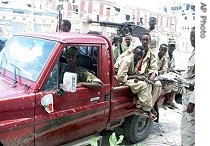2007年VOA标准英语-Latest Somalia Fighting Raises Concerns Over Fu(在线收听)
Washington
27 April 2007
Somalia's Prime Minister, Ali Mohamed Gedi, is claiming victory over Islamic insurgents in Mogadishu, and he says fighting in the Somali capital is almost over. But the latest round of clashes raises concerns about future stability in Somalia and has led to calls on the transitional government to reach out to dissident elements. VOA's Bill Rodgers reports.

Somali Transitional Federal Soldiers with an anti-aircraft gun mounted on the pickup and soldiers carrying AK 47s in the street of Mogadishu, 27 Apr 2007
The latest fighting in Mogadishu broke out almost two weeks ago as Ethiopian and Somali forces began a major offensive against Islamic insurgents. Casualties have been high – and more than 300,000 people are estimated to have fled the city since February, turning Mogadishu into a ghost town.
U.S. officials have called for an end to the fighting, with Assistant Secretary of State for African Affairs, Jendayi Frazer, also urging dialogue.
"I think it is very clear that the key to solving the situation in Somalia and stabilizing it is to have this inclusive dialogue,” said Frazier. “And so trying to get the Transitional Federal Government to reach out to the various clans and sub-clans is a large part of our diplomacy."
In December, Ethiopian troops, with tacit American support, helped the forces of Somalia's transitional government rout the Islamic Courts militias that had controlled Mogadishu and much of the country. Many Somalis welcomed the victory of the transitional government – hoping the restoration of a central government would end some 16 years of anarchy.
But the transitional government appears to have alienated some of the powerful Somali clans.
And David Shinn of George Washington University says it may be too late to reach out to them now. "I do think they missed a huge opportunity in January of this year when they were in a very strong position, the Islamic Courts were very much on the run from Mogadishu, and they had the opportunity then to seriously reach out and share power with moderate elements of the Islamic Courts, with some of the business people that were supporting the Courts, they didn't reach out sufficiently to these groups and I think that basically has backfired," said the professor.
Despite military setbacks, many analysts say the Islamist militias will remain active -- and further unrest in Somalia appears likely. This could have wider repercussions, with some experts citing the rebel attack against a Chinese-run oil facility in Ethiopia as having links to the unrest in Somalia. Professor Shinn sees the attack as part of a rise in terrorism in the region.
"Local groups for their own purposes are engaging in terrorist activities, it isn't necessarily related to al-Qaida or any international grouping at all. But it's the use of terrorist tactics to gain your political ends and this is happening with much greater frequency."
Somalia's Prime Minister, Ali Mohamed Gedi, says fighting in Mogadishu is almost over and that the Islamist insurgents have been defeated. But it is not certain that the peace will last.